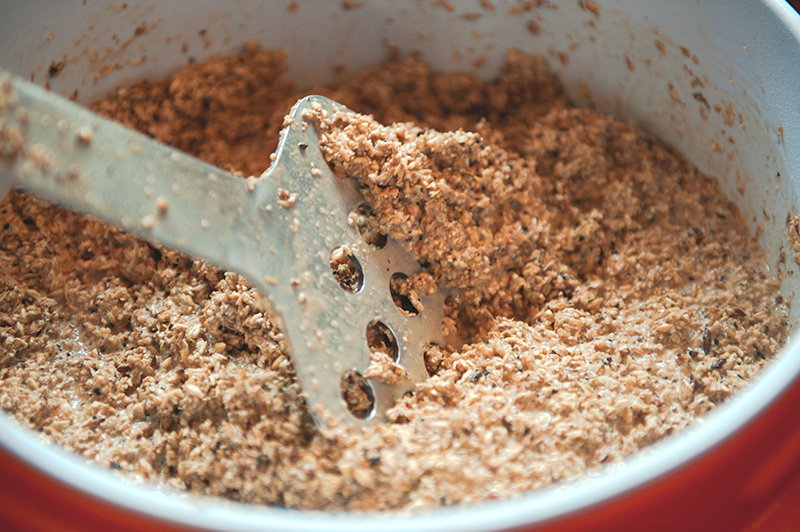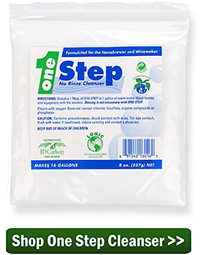 A stuck mash can really throw a wrench into your brew day. Things are going great: you planned your beer recipe, purchased all your homebrewing ingredients, mashed in, and pH and temperature are right where you want them. Then you start the sparge and collecting the wort from your mash tun, and all you get it a trickle – then it stops completely. What’s supposed to take an hour extends into two hours or more as you try to figure out how to separate the wort from the grain… what to do!
A stuck mash can really throw a wrench into your brew day. Things are going great: you planned your beer recipe, purchased all your homebrewing ingredients, mashed in, and pH and temperature are right where you want them. Then you start the sparge and collecting the wort from your mash tun, and all you get it a trickle – then it stops completely. What’s supposed to take an hour extends into two hours or more as you try to figure out how to separate the wort from the grain… what to do!
The best thing to do, of course, is everything in your power to avoid a stuck mash. No one wants a sparge that takes too long. In the event a stuck mash occurs, however, more drastic action is required. With that said, here are tips for preventing a stuck mash and tips to fix a stuck mash.
Tips for Preventing a Stuck Mash
- Clean your mash tun between each use. This goes beyond just a soak in PBW. Take apart the various components of your mash tun and get in there to scrub ‘em out well.
- Don’t over-crush. When crushing the malted grains, make sure they aren’t crushed too finely. If there’s a lot of flour in the grist, it can really gunk up the wort outlets.
- Some grains tend to get sticky, especially wheat, rye, and oats. Add rice hulls to your mash to make sure that wort can flow without getting clogged. The hulls won’t affect the flavor, color, or gravity of your beer.

- Watch you water-to-grain ratio. The recommended ratio is 1-1.5 quarts of water per pound of grain. Some all-grain beer recipes call for a thinner or thicker mash. If your equipment tends to give you a stuck mash, lean towards the higher end of the range. Take good notes so you can build upon your previous experiences!
- Take your time. When your mash is complete, draw off the first runnings slowly, allowing the grain bed to set. Draw off too fast and the grain bed can compact on itself, creating a stuck mash.
How to Fix a Stuck Mash
- Stir it up. If you’re lucky, a quick, vigorous stir will be all it takes to fix your stuck mash. You’ll have to reset the grain bed, so draw off the wort slowly, gradually increasing the rate of flow.
- Clear that clog.
 It the stir didn’t fix things, chances are good that there’s a clog in your mash tun. Dump the mash into a spare fermenting bucket. Since you will eventually boil the wort, the bucket doesn’t have to be sanitized, but it should be clean. Take apart your equipment, clear the clog if there is one, return the mash to the mash tun and start over.
It the stir didn’t fix things, chances are good that there’s a clog in your mash tun. Dump the mash into a spare fermenting bucket. Since you will eventually boil the wort, the bucket doesn’t have to be sanitized, but it should be clean. Take apart your equipment, clear the clog if there is one, return the mash to the mash tun and start over.
- Use a colander. If you still can’t get your wort to flow, you probably need a new mash tun! To save your brew, pour the mash through a clean strainer and into your brew pot. The wort in the brew pot can be run through the strainer and the collected grains multiple times to improve clarity. This process is called a vorlauf.
To be sure, having a stuck mash can be a real pain. But don’t let them stop you from making great beer! If the sparge is taking too long you now know what to do to fix the stuck mash. Once it’s fixed, relax, have a homebrew, and take steps to prevent having stuck mashes in the future.
Do you have a stuck mash horror story? Share in the comments!

Not really a stuck mash, but I just did an all grain brew a couple days ago and when I started collecting the wort, it was running very slowly, so I blew up the hose and cleared a clog; but that did not fix the problem. It was running very slowly again and I noticed some grain in the drain hose. Oh, no did my filter come off the output hose? It sure did and I had to scoop out all the 170 degree grain and sticky wort, re-attach the filter (just a stainless steel hose braid) to the outlet hose and then put all the sticky stuff back in the tun. What a mess, but it all came out well in the end. Needless to say, I have taken measures to ensure that never happens again.
I had a stuck sparge a while back and used this trick to avoid a headache. Stick a bicycle pump into the drain valve, start pumping and slowly open the valve to full. I had to do it twice but it lautered just fine afterwards. And the beer turned out fine! I am sure it would work with a motorized pump as well.
I’ve read about this before I attempted my first all grain batch today… Unfortunately my tap doesn’t like all grain. Blowing back didn’t help.. I resorted to dumping all my grain into a giant net bag from biab methods.. suffice to say.. tea urn taps are pathetic. Going to putting a big quarter turn valve in, possibly a false bottom too…
HUGE STUCK MASH!!! I’ve brewed hefeweissen many times, alway 70% wheat, 30% German pils with about 1/2 lb of rice hulls. I always put the grain in the tun, underlet the strike water (shoot for a dough in of 135 deg), mix the grain, then draw off for a decoction. This time I did something I’ve never done and will never do again: I heated the strike water in the mash tun and added the grain in over the top – first the barley, then the wheat, then the rice hulls. DISASTER! The wheat glued together. I added another pound of rice hulls and stirred. I emptied the mash into another pot…..twice. Nothing worked. I ended up abandoning my brew day and dumped it. Just make sure your wheat, barley and rice hulls are properly mixed BEFORE you strike.